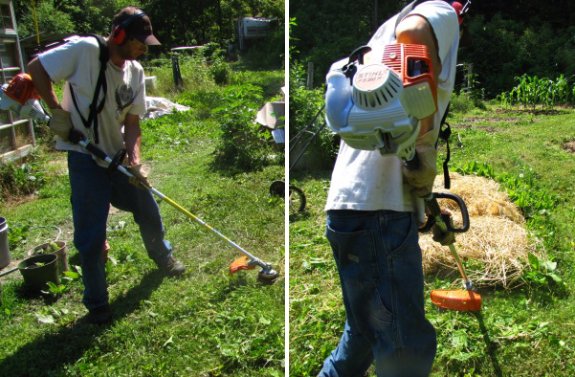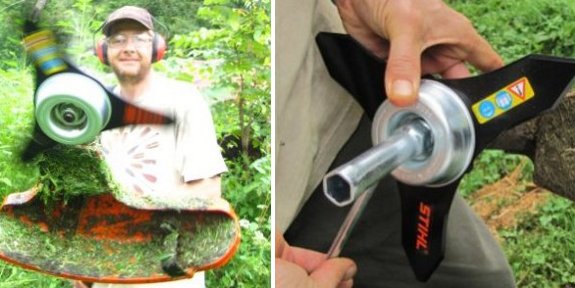
Stihl metal brush knife update
I've been having second
thoughts on the tri-bladed
metal brush knife also known as the "Ninja Blade".
It cuts heavy grass and light
scrub, but every now and then I would hit a small tree or the ground of
a hillside that would stop it cold.
The FS90-R
recovers nicely, but can only handle a limited number of cold stops
like that before the flywheel shaft key sheers.

About an hour of research on
a weedeater forum revealed some bad news. Turns out you can't just
replace the flywheel shaft key. The key is built into the flywheel,
which would cost 65 dollars if you could order one, which you cannot
unless you're an official Stihl
dealer.
Ours is still under
warranty, but it's been in the shop for a month, and when I called them last week I got
the impression from the guy I talked to that their technician is either
slow or buried or both.
Want more in-depth information? Browse through our books.
Or explore more posts by date or by subject.
About us: Anna Hess and Mark Hamilton spent over a decade living self-sufficiently in the mountains of Virginia before moving north to start over from scratch in the foothills of Ohio. They've experimented with permaculture, no-till gardening, trailersteading, home-based microbusinesses and much more, writing about their adventures in both blogs and books.
Want to be notified when new comments are posted on this page? Click on the RSS button after you add a comment to subscribe to the comment feed, or simply check the box beside "email replies to me" while writing your comment.


Roland-From what I read on the forum I think there is no nut to tighten, but it's hard to tell because Stihl does not make their parts catalogs available.
I briefly thought about taking it apart to see if I could figure out the problem, but the warranty should be good for another 11 months.
@Andrew: interesting. But why does a single-cilinder two-stroke need a harmonic damper?
Combining the key with the (die-cast?) flywheel sounds like a cost-cutting measure. Cheaper for the manufacturer, but not so much for the user after the warranty has expired.
My first exposure to two-stroke engines was an old vélosolex that I officially wasn't old enough to drive at that time. Now that was a simple and reliable engine. You could easily see how everything worked. And economical too, around 235 mpg.
@ Mark, A harmonic damper is typically the crankshaft pulley on an automobile. Some people call it a harmonic balancer as well, but really it dampens the vibrations.
All small engines (really all engines) will run much better with non-ethanol fuel. The slightest amount of water dissolved into the ethanol in modern gas will cut the performance of a small engine drastically, and will make them hard to start as well. That's not even counting how corrosive ethanol is if it sits... (can you tell I'm a fan?)
@ Roland, All engines need a harmonic damper, especially single cylinders. This piece simply adds mass to the rotating assembly, it reduces the initial spike of the power stroke and helps carry the engine around through the compression stroke. This is crucial for keeping those blades spinning in that tough grass.
I believe these flywheels are die cast, if not then they are little more than pot metal. It's pretty light overall, only a pound or two (but that adds a lot to a small displacement engine). A replaceable key is definitely a much better design for the consumer overall, but I'm not aware of any weed eaters that have one.